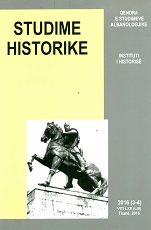Ndikimi i vendimit të Gjykatës së Hagës për shkollat private në procesin e kombëtarizimit të institucioneve shqiptare (1935-1938)
The effect of the Hague Court verdict concerning private schools in the process of nationalization of Albanian institutions (1935-1938)
Author(s): Beqir MetaSubject(s): State/Government and Education, Interwar Period (1920 - 1939), Ethnic Minorities Studies
Published by: Qendra e Studimeve Albanologjike
Keywords: League of Nations; private schools; Albania; Hague Court;
Summary/Abstract: The verdict of the League of Nations which forbade the nationalization of private schools in the area of Greek minority urged the Greek chauvinist feelings and aspirations even in other regions where these tendencies seemed to have lessened up so far. The consulates and the Greek agents made it to enliven the Greek chauvinist movement in the prefecture of Korça, on the question of Orthodox Church, on education and furthermore on other matters of Greek chauvinist feelings. The Greek circles were so heartened by the new situation caused after the verdict of The Hague Court, that they were exerting pressure even on Korçanationalist orthodox Christians to make them give up supporting the Autocephalous Church and other national institutions. The policy of the Albanian government to protect the national institutions received a hard attack even from Italy which insisted and exerted high pressure on the reopening of Italian schools, especially the Catholic ones. The Albanian public and press reacted in favor of the national institutions. In 1938 the phenomenon of opening minority schools in non-minority villages went on. These actions were taken under the urge of Greek consulates. The acceptance of The Hague Verdict from the Albanian government made the Greek chauvinist elements even more active in Himara. On the other hand, Himara activists with pro-Albanian feelings required that the national institutions be strongly protected. Himara was a concern for the government, chiefly because of being considered as a detachment of the Greek action for the enlivenment of Hellenism in South Albania. In August 1938, in accordance with the application of the agreement achieved with the Greek government the Council of Ministers of Albania decided principally to allow the opening of three Greek minority schools in Himara. The decision of the Albanian government was an important change and a step backwards in its policy on the consolidation of education and further of the national identity in Himara. The achieved agreement with the Greek government had a totally asymmetric character. By June 1938 the state schools of Himara were attended only by a few children whose parents required that their children be awarded scholarships for the high school.
Journal: Studime Historike
- Issue Year: 2016
- Issue No: 03-04
- Page Range: 161-190
- Page Count: 30
- Language: Albanian
- Content File-PDF

